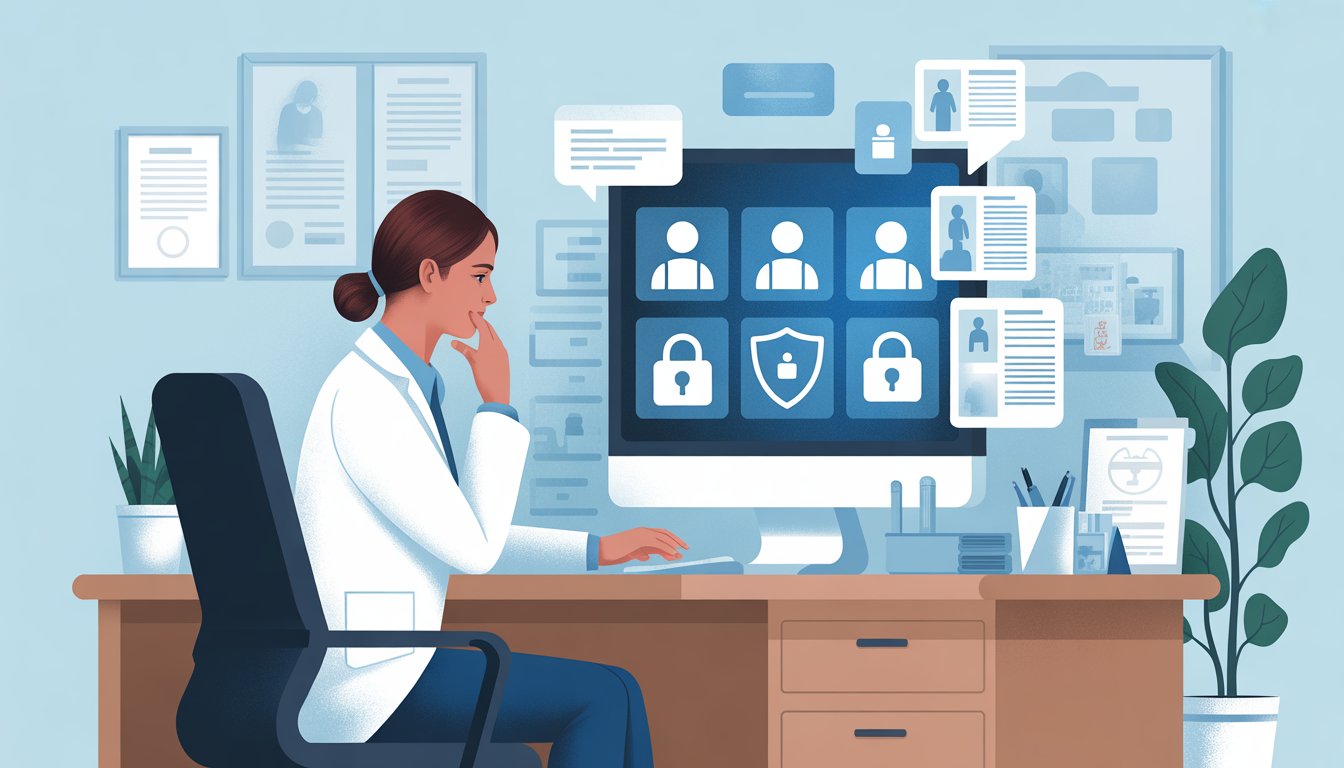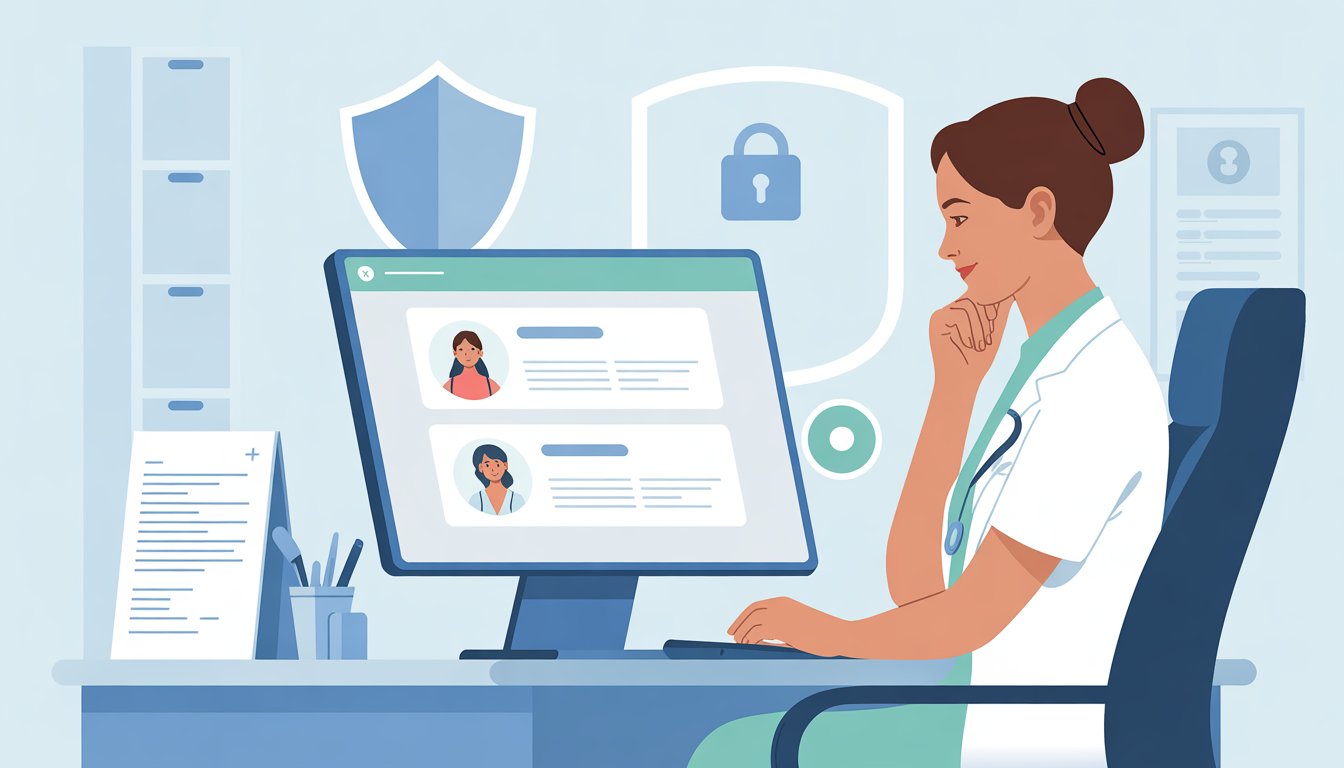Online reviews have become a major part of how patients choose their healthcare providers. When patients leave reviews, both positive and negative, healthcare practices face a difficult challenge.
They want to respond and show they care, but they must also follow strict privacy laws.

Healthcare practices must never share any patient health information when responding to online reviews, even if they want to correct false claims or defend their care. This includes not acknowledging that the person was even a patient.
Even small details can break privacy rules and lead to serious legal problems. The safest approach is often not to respond at all.
When practices do choose to respond, they must keep their answers very general. They should focus on thanking patients or inviting them to discuss concerns privately through proper channels.
Key Takeaways
- Healthcare providers cannot share any patient information when responding to online reviews, including confirming someone was a patient.
- The safest approach is to keep responses very general or avoid responding to reviews entirely.
- Practices should invite reviewers to discuss concerns privately through official channels instead of responding publicly.
Understanding Patient Privacy Laws When Responding to Reviews

Healthcare providers must follow strict federal and state privacy laws when responding to patient reviews online. These regulations protect patient information and carry serious penalties for violations, including fines up to $50,000 for single incidents.
Overview of HIPAA and PHI
HIPAA protects all Protected Health Information (PHI) that identifies an individual patient. This includes medical records, treatment details, and even confirming someone was your patient.
When a patient leaves a review, you cannot acknowledge their patient status. Simply thanking a reviewer by name or mentioning their visit violates HIPAA regulations.
PHI includes:
- Patient names and contact information
- Medical conditions or treatments
- Appointment dates or visit confirmations
- Payment information
- Any details that could identify a specific patient
You must treat all review responses as public communications. Even positive reviews require careful handling to avoid disclosing PHI.
HIPAA applies regardless of what patients share in their reviews. A patient revealing their own medical information does not give you permission to discuss it publicly.
Office for Civil Rights Enforcement
The Office for Civil Rights (OCR) enforces HIPAA violations and investigates patient complaints about privacy breaches in review responses.
OCR has imposed significant penalties on healthcare providers for responding inappropriately to reviews:
Provider TypePenalty AmountViolationDental Practice$50,000Disclosed patient PHI in Google review responseHealthcare Provider$10,000Multiple PHI disclosures on review pagesPlastic SurgeryInvestigationPosted patient information in review response
Violations trigger mandatory breach notifications. You must notify the affected patient in writing and report the incident to OCR within 60 days.
Even investigations without penalties cost time and money. OCR reviews can uncover other HIPAA violations and lead to additional scrutiny of your practice.
State Privacy Regulations in Review Responses
State privacy laws often provide additional patient protections beyond federal HIPAA requirements. These regulations vary by location and may impose stricter rules for online communications.
Some states require specific consent procedures before any patient information disclosure. Others have enhanced penalties for privacy violations in digital communications.
Key state considerations:
- Medical board regulations on patient communications
- State-specific confidentiality requirements
- Professional licensing standards for online interactions
- Local consumer protection laws
You should consult legal counsel familiar with your state's regulations. Generic HIPAA compliance may not meet all local requirements for patient privacy protection.
State medical boards can impose separate disciplinary actions for privacy violations. These sanctions may include license suspension or additional compliance requirements.
Core Principles for Responding to Online Patient Reviews

Healthcare providers must follow strict privacy rules when responding to patient reviews online. The key is to respond without confirming patient relationships or sharing any protected health information.
HIPAA-Compliant Communication Strategies
Never acknowledge that someone was your patient. This includes avoiding phrases like "thank you for being our patient" or "we remember your visit."
Your responses should focus on general practice policies. Talk about how your office normally handles appointments or billing questions.
Keep responses brief and professional. Avoid getting into specific details about procedures or treatments.
Use templates for common review types. This helps ensure consistency and reduces the risk of accidentally sharing protected information.
Document all your responses. Keep records of the original review, your response, and any follow-up conversations.
Train all staff members who might respond to reviews. Everyone needs to understand HIPAA rules and your practice's response policies.
Risks of Acknowledging Patient Relationships
Even confirming someone was a patient violates HIPAA. This simple acknowledgment reveals protected health information without written consent.
Responding to specific medical details creates major legal risks. You could face HIPAA violations, lawsuits, and damage to your practice reputation.
Patients might share false information in their reviews. If you respond to correct these details, you confirm their patient status and reveal private medical facts.
Some healthcare providers think positive reviews are safe to acknowledge. This is wrong. HIPAA protections apply to all patient information, regardless of whether the review is good or bad.
The safest approach is treating all reviewers as non-patients. This protects you from accidentally confirming patient relationships.
Generalizing Responses Without Disclosing Information
Focus on your practice's general procedures and values. Explain how you typically handle scheduling, billing, or patient concerns without referencing specific cases.
Use neutral language that applies to any situation. For example: "We strive to provide clear communication about all procedures and costs."
Address concerns without confirming details. If someone mentions wait times, discuss your general scheduling policies rather than their specific appointment.
Invite private follow-up conversations. Say something like "Please contact our office directly so we can address your concerns properly."
Avoid defensive language or arguing with reviewers. Keep responses calm and professional, focusing on your commitment to quality care.
Thank reviewers for their feedback without acknowledging their patient status. This shows you value input while maintaining privacy boundaries.
Managing Negative Online Reviews While Protecting Privacy
Healthcare practices must balance reputation management with strict patient privacy laws when addressing negative feedback. The key is responding professionally without revealing any patient information or taking conversations to private settings.
Handling Negative Feedback Responsibly
When negative online reviews appear, your response strategy must prioritize patient privacy above all else. Never acknowledge that the reviewer is your patient or reference specific details from their care.
Keep responses brief and generic. The more you explain, the higher your risk of violating HIPAA regulations.
Your response should focus on your practice's general policies and commitment to quality care. Avoid defending specific actions or procedures mentioned in the review.
Safe response elements include:
- Thanking the reviewer for their feedback
- Stating your commitment to patient satisfaction
- Describing general practice policies
- Inviting further discussion through private channels
Do not dispute specific claims in the review. This can accidentally confirm the person was your patient and reveal protected health information.
Redirecting Conversations to Private Channels
The safest approach for addressing negative feedback is moving discussions offline immediately. This protects both patient confidentiality and your practice's reputation.
Effective redirection methods:
- Provide your practice's phone number
- Offer a direct email contact
- Suggest scheduling an in-person meeting
- Reference your patient relations coordinator
Contact the reviewer directly when possible. Speaking with patients individually about their concerns shows transparency and genuine care for their experience.
This private approach allows you to address specific issues without violating privacy laws. You can discuss details of their care and work toward solutions.
Some practices choose not to respond to reviews at all. This eliminates any risk of privacy violations while avoiding potential online confrontations.
Staff Training and Internal Policies for Online Review Responses
Healthcare providers must train staff on HIPAA compliance rules for review responses and create clear protocols that protect patient privacy. Proper training prevents costly violations while maintaining professional communication with patients online.
Importance of Privacy Training in Healthcare Practices
HIPAA training is required for all healthcare staff who handle patient information. This includes employees who respond to online reviews.
Your team needs to understand what counts as protected health information. Even small details can violate privacy laws if shared incorrectly.
Key training topics include:
- Identifying protected health information in reviews
- Recognizing when not to respond at all
- Using generic language that protects privacy
- Understanding legal consequences of violations
Staff must learn to avoid confirming or denying patient relationships. Never try to identify who wrote a review or reference specific visits.
Training should happen regularly, not just once. New laws and review platforms create fresh challenges for healthcare providers.
Document all training sessions. Keep records of who attended and what topics you covered.
Developing HIPAA-Compliant Response Protocols
Create written policies for online review responses before you need them. Clear protocols help staff make quick decisions without risking patient privacy.
Your response protocol should include:
SituationActionPositive reviewThank patient genericallyNegative reviewAcknowledge concern without detailsReview with medical detailsDo not confirm or deny informationFalse accusationsRespond professionally, invite private discussion
Develop pre-approved response templates for common situations. Generic responses reduce the chance of privacy violations while maintaining professional communication.
Train staff to recognize when not to respond at all. Some reviews contain too much medical information to address safely.
Assign specific team members to handle review responses. Limit access to reduce mistakes and ensure consistency.
Create an approval process for complex responses. Have a supervisor or compliance officer review difficult situations before posting replies.
Role of Online Reputation and Patient Trust in Healthcare
Online reviews directly shape how patients choose healthcare providers and build trust with medical practices. Patient trust grows stronger when healthcare organizations actively manage their digital reputation while maintaining transparency in their responses.
Influence of Reviews on Patient Experience
72% of patients use online reviews as their first step when finding a healthcare provider. This makes your digital reputation a critical factor in patient acquisition.
Reviews create social proof that influences patient decisions. When potential patients see positive feedback from others, they feel more confident choosing your practice.
Your online reputation affects patient expectations before they visit. Patients who read positive reviews often arrive with higher trust levels.
Negative reviews can harm patient perception even before the first appointment. One bad review among many good ones has less impact.
However, multiple negative reviews create doubt about your practice quality. Patients often trust peer reviews more than marketing materials.
They view other patients' experiences as honest feedback about your services.
Building and Maintaining Patient Trust
Strong online reputations help build credibility with new patients. Trust develops when you respond professionally to both positive and negative reviews.
Your response style shows patients how you handle concerns. Professional, caring responses demonstrate that you listen to patient feedback.
Asking satisfied patients to leave reviews helps balance your online presence. Many positive reviews dilute the impact of occasional negative feedback.
Monitor your reviews regularly to understand patient concerns. Compare online feedback with your internal patient satisfaction data to identify improvement areas.
Respond quickly to reviews when appropriate. Taking time to address patient concerns publicly shows other potential patients that you care about their experience.
Best Practices and Examples of HIPAA-Compliant Review Responses
Healthcare providers must use specific templates and professional language when responding to online patient reviews. Your responses should address both positive and negative patient feedback while protecting all health information.
Appropriate Templates and Sample Responses
You need standard response templates that protect patient privacy in every situation. Never confirm appointment details, medical conditions, or treatment plans in your replies.
For positive reviews:
- "Thank you for your kind words! We appreciate your feedback."
- "We're glad you had a positive experience with our team."
- "Thank you for choosing our practice for your healthcare needs."
For negative reviews:
- "We apologize for any inconvenience. Please contact our office privately to discuss your concerns."
- "Thank you for your feedback. We would like to address this matter with you directly."
- "We take all patient concerns seriously. Please call us so we can help resolve this issue."
Your templates should always invite private discussion. This moves sensitive conversations away from public platforms.
Avoid using patient names or specific details. Even if the reviewer mentions their condition, you cannot acknowledge it in your response.
Addressing Both Positive and Negative Feedback
You should respond to all online patient reviews within 24-48 hours when possible. This shows other potential patients that you care about patient feedback.
Positive feedback responses should be brief and grateful. Thank the reviewer without confirming their visit or treatment details.
Keep your tone warm but professional. Express appreciation for their trust in your healthcare services.
Negative feedback requires more care. Stay calm and professional even when reviews seem unfair or inaccurate.
Never argue with reviewers or provide your side of the story publicly. This often reveals protected health information.
Acknowledge their concerns and offer to discuss the matter privately. Provide your office phone number or secure contact method.
Frequently Asked Questions
Healthcare providers must follow strict HIPAA rules when responding to online reviews. These rules prevent practices from sharing any patient health information, even when patients mention specific details about their care.
What are acceptable ways for healthcare providers to respond to online patient reviews without violating HIPAA?
You can respond to reviews using generic, professional language that never confirms or denies the reviewer was your patient. Thank reviewers for their feedback without acknowledging specific details about their visit.
Use standard responses that address common concerns without revealing any protected health information. Focus on your practice's general policies and commitment to quality care.
Keep responses brief and professional. Longer explanations increase your risk of accidentally sharing protected information.
What specific guidelines must medical practices follow when replying to patient reviews on platforms like Healthgrades?
You must never acknowledge that a reviewer is or was your patient, even if they share specific details about their visit. This includes avoiding phrases like "thank you for choosing our practice" or "we remember your visit."
Create template responses that work for different types of reviews. These templates should focus on your practice's general approach to patient care without mentioning specific treatments or procedures.
Document all review responses and keep records of your replies. This documentation helps protect your practice if privacy questions arise later.
How can healthcare organizations maintain patient confidentiality when addressing feedback in public forums?
Respond only with information that is already public about your practice. This includes your services, office hours, staff qualifications, and general treatment approaches.
Never confirm details that patients share in their reviews, even if the information seems positive. Any acknowledgment of specific patient experiences violates HIPAA rules.
Direct patients to contact your office privately for specific concerns. This allows you to address their issues while protecting their privacy.
What are the legal implications for healthcare staff revealing patient information in response to online reviews?
Violating HIPAA by sharing patient information in review responses can result in significant fines and penalties. These violations can also damage your practice's reputation and lead to lawsuits.
Even accidental disclosures of patient information carry legal consequences. Staff members who respond to reviews must understand they are legally prohibited from sharing any protected health information.
Your practice remains responsible for all staff responses to online reviews. Proper training is essential for anyone who might respond to patient feedback.
How should a medical practice approach negative reviews to ensure compliance with patient privacy laws?
Address negative reviews with empathy while staying within HIPAA boundaries. Express concern about the reviewer's experience without confirming they were your patient.
Focus your response on your practice's commitment to quality care and patient satisfaction. Invite the reviewer to contact your office privately to discuss their concerns.
Avoid defending specific treatment decisions or explaining medical procedures in your public response. These details often contain protected health information.
What training should healthcare staff undergo to handle patient information correctly when engaging with reviews?
Train staff on HIPAA requirements before allowing them to respond to any online reviews. This training must cover what constitutes protected health information and how it applies to public responses.
Practice using template responses with your team so they understand appropriate language and tone. Role-playing different review scenarios helps staff learn proper response techniques.
Update training regularly as review platforms and privacy laws change. Annual refresher training helps ensure staff maintain proper privacy practices when engaging with patient feedback.










